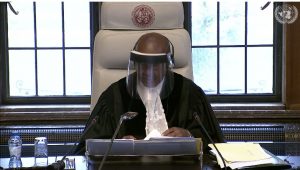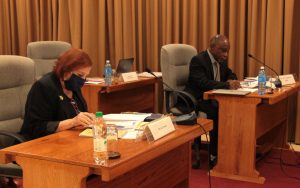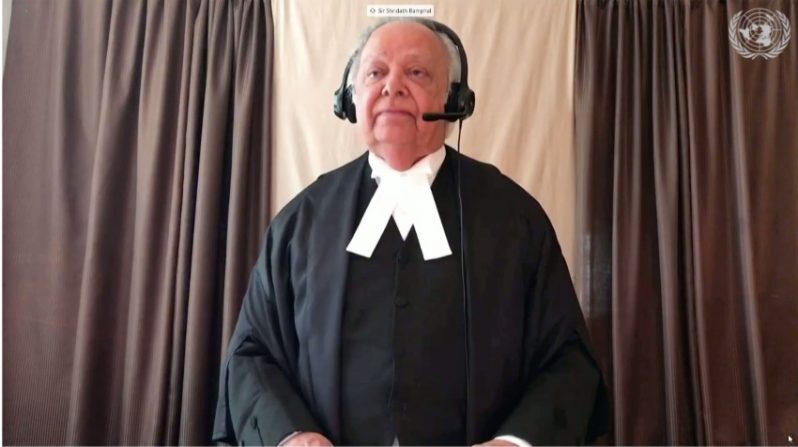…Sir Shridath tells ICJ in historic border controversy case
By Svetlana Marshall
DISTINGUISHED Guyanese Diplomat and Co-Agent, Sir Shridath Ramphal, in leading the arguments before the International Court of Justice (ICJ) in the 1899 Arbitral Award Case – Guyana v. Venezuela, said the case was of significant importance to the people of Guyana, who are united in defence of their sovereignty and territorial integrity of their homeland.
Guyana is seeking to obtain a final and binding judgment that the 1899 Arbitral Award, which established the location of the land boundary between then British Guiana and Venezuela, remains valid, and that the Essequibo region belongs to Guyana, and not Venezuela.
On Tuesday, in the absence of Venezuela, who opted not to participate in the proceedings, a panel of judges led by President of the ICJ Abdulqawi Yusuf heard legal arguments on the issue of jurisdiction from international lawyers, representing Guyana.

Sir Shridath, in his virtual presentation, told the ICJ that contrary to International Law and the binding effect of the1899 Arbitral Award, Venezuela, Guyana’s neighbour to the west, cultivated a nationalist passion to disavow the Arbitral Award, and in doing so, laid claim to almost three-quarters of Guyana.
“It was not always so. The arbitral proceeding in Paris was after all instigated at the behest of Venezuela, and Venezuela enjoyed and continues to enjoy the gains brought to them by the Arbitral Award. Yet the process that brings us here is rooted in Venezuela’s repudiation of that award. Repudiation more than six decades after it was handed down to it,” Sir Shridath told the ICJ. He noted that Venezuela’s contention came on the eve of Guyana’s (British Guiana’s) independence in the early 1960s. Venezuela had contended that the Arbitral Award was null and void.
Sir Shridath informed the ICJ that when Venezuela first made the contention in 1962, the United Kingdom, British Guiana and soon after independent Guyana vigorously rejected it while affirming the validity of the award.
In Geneva in February 1966 Guyana and Venezuela signed onto the Geneva Agreement with the clear intention of bringing an end to the controversy surrounding the Arbitral Award. At the time, Sir Shridath was Guyana’s Attorney General. He said it was under Article IV (2) of the Geneva Agreement that the United Nations Secretary-General António Guterres referred the controversy to the ICJ.
He submitted to the Court that Venezuela’s contention that the ICJ has no jurisdiction is simply baseless. “Mr President, almost 60 years of Venezuela trying and failing to spoil the sanctity of the Treaty of Washington and to nullify the Paris Award, the Secretary-General of the United Nations indicated to the Presidents of Guyana and Venezuela in these words and I quote ‘I have fulfilled the responsibility that has fallen on me within the framework set by my predecessor and significant progress not having been made toward arriving at a full agreement for dissolution of the controversy, I have chosen the International Court of Justice as the means that is now to be used for its solution.’ That is why we are here, attended by the faith of the people of Guyana in this international Court of Justice and in the rule of law internationally”, Sir Shridath told the judges.
Though Venezuela maintains that the Arbitral Award is null and void, and that the ICJ has no jurisdiction to hear the case, it was a no show on Tuesday. However, had long indicated that it will not participate in the proceedings.
“It is unfortunate that Venezuela has chosen not to participate in these hearings. Undoubtedly, it would have been more helpful to the Court for both parties to appear to fully present their arguments in the first round and respond to each other in second. But at least the Court has not been left to speculate as to what Venezuela might have said had it appeared in this Great Hall of Justice”, Sir Shridath said as he pointed to Venezuela’s submission of a Memorandum.

Meanwhile, speaking from the Great Hall of Justice at the Peace Palace in The Hague, President of the ICJ, Abdulqawi Yusuf recalled that it was on the March 29, 2018 that Guyana initiated legal proceedings against Venezuela before the Court to determine the legal validity and binding effect of the 1899 Arbitral Award, which established the boundary between British Guiana and Venezuela.
Justice Yusuf recalled that on June 18, 2018, during a meeting he had summoned as President of the ICJ, Venezuela’s Vice President Delcy Eloína Rodríguez Gómez indicated that the Venezuelan Government holds fast to the belief that the Court lacks jurisdiction to hear the Case, and as such, her country has opted not to participate in the proceedings. During that meeting, the Venezuelan Vice President handed the ICJ’s President a letter from the President of Venezuela, Nicolás Maduro, which conveyed the country’s position.
On June 19, 2018, the ICJ via an Order indicated that it was important to resolve, firstly, the issue of whether it had jurisdiction to hear the case. In keeping with that Order, Guyana was required to file a Memorial, addressing the issue of the court’s jurisdiction to confirm the validity of the 1899 Arbitral Award (Guyana v. Venezuela), by November 19, 2018. Venezuela, though it was required to file a Counter-Memorial by April 18, 2019, opted not to so and instead file a Memorandum in November, 2019. That Memorandum, Venezuela said, was intended to provide the Court with “information” during the case.
The ICJ President was keen to note that Court does not include, on the bench, a judge of the nationality of either of the parties. However, he said Guyana availed itself of the right conferred upon to choose a judge ad hoc and chose Justice Hilary Charlesworth. Venezuela, however, in line with its decision not to participate in the proceedings, did not avail itself of the right to choose a judge ad hoc in the case. Justice Charlesworth, on Tuesday, made a solemn declaration.
In light of the COVID-19 pandemic, the some members of the ICJ inclusive of Justice Charlesworth appeared virtually in addition to Guyana’s delegation led by its Agent, Carl Greenidge. Tuesday marked the first time that the ICJ conducted its hearing with virtual appearances from the party involved.





.jpg)








